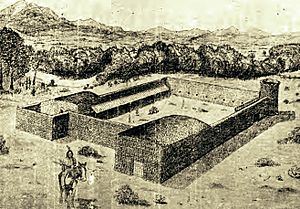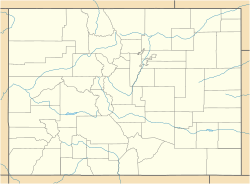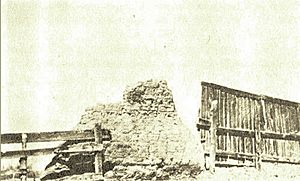Fort Lupton (Colorado) facts for kids
Quick facts for kids
Fort Lupton
|
|
|---|---|
|
Trading post and fort
|
|

Sketch of Fort Lupton, 1913, Dr. K.L. Clock. Developed from examinations of the ruins of the fort and interviews with pioneers. Given to the Colorado Historical Society.
|
|
| Nickname(s):
Fort Lancaster
|
|
| Country | United States |
| State | Colorado |
| County | Weld |
| City | Fort Lupton |
| Founded by | Lawrence Lupton |
Fort Lupton was an important trading post in Colorado. It was built around 1836 or 1837 and was used until 1844. After its time as a trading post, it served as a stage station and even a home. Over time, the building fell apart. By the early 1900s, only a small part of one wall was left. Today, a new Fort Lupton has been rebuilt very close to where the original stood. It is now part of the South Platte Historical Park in Fort Lupton, Colorado.
Contents
History of Fort Lupton
Building the Fort
Fort Lupton was first called Fort Lawrence. It was built by Lancaster Lupton. He was a former lieutenant and a dragoon soldier. Dragoons were soldiers who rode horses but fought on foot. Lupton had studied at West Point.
He first saw the area during an expedition with Colonel Henry Dodge. After that trip, Lupton left the army. He came back to the South Platte area to build his trading post. Mexican and Native American men helped him.
The fort had strong walls made of adobe bricks. These walls were 15 feet tall. The fort covered an area about 125 feet by 150 feet. For protection, it had a tower to watch the land around it. The second floor had small holes for shooting rifles if needed. Inside the fort were small rooms for living and trading. There was also a blacksmith shop and a place to store supplies.
Life at the Trading Post
Fort Lupton was one of several trading posts built along the South Platte River in the late 1830s. Other forts nearby included Fort Jackson, Fort Vasquez, and Fort Saint Vrain.
Trappers and Native Americans came to Fort Lupton to trade. It was located on the Trapper's Trail. This trail connected Laramie, Wyoming to Santa Fe. People traded things like buffalo hides and beaver furs. In return, they received food, cloth, blankets, pots, pans, knives, and guns. Supplies and animals were also sold to settlers. A trader could earn enough money in one summer to buy a farm back east.
About 40 people might have lived at the trading post. Many of them were Spanish-speaking workers. Famous people like Rufus Sage, Kit Carson, and John C. Frémont visited Fort Lupton. In the early 1840s, the fur trade became less popular. Because of this, many trading posts, including Fort Lupton, closed down.
What Happened Next?
After Fort Lupton closed, it was empty for a while. Then, in 1859, it was used as a stage station during the gold rush. Stage stations were places where stagecoaches could stop, change horses, and allow passengers to rest.
Later, a family named Ewing lived in the fort for several years. By 1900, the fort was falling apart. By the 1920s, only one wall was left standing. In 1926, a group called the Territorial Daughters of Colorado put up a fence and a historical marker at the site.
Rebuilding the Fort
The land where the fort once stood was later used for an oil rig. Eventually, the South Platte Historical Society bought the land. The original site of the fort is now an archaeological site. This means it's a place where scientists study old human history.
In 2009, Fort Lupton was rebuilt. It stands a few yards from the original spot. Some of the original adobe bricks were even used in the new building. The South Platte Valley Historical Park was created by the South Platte Valley Historical Society. This park is northwest of the city of Fort Lupton. It includes the rebuilt adobe trading post and teaches visitors about the history of settlement in the area.
- tDAR id: 63757
 | Kyle Baker |
 | Joseph Yoakum |
 | Laura Wheeler Waring |
 | Henry Ossawa Tanner |



